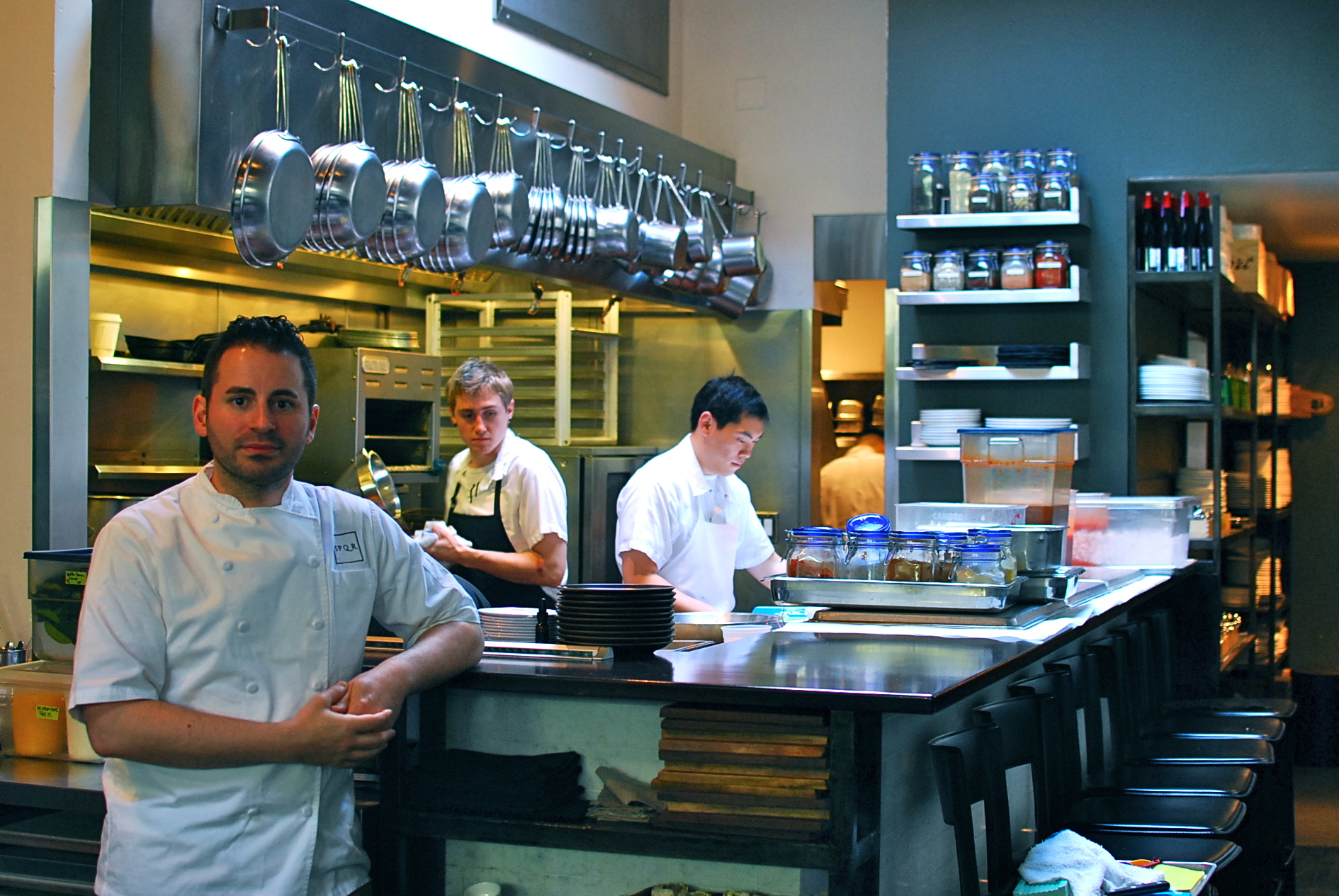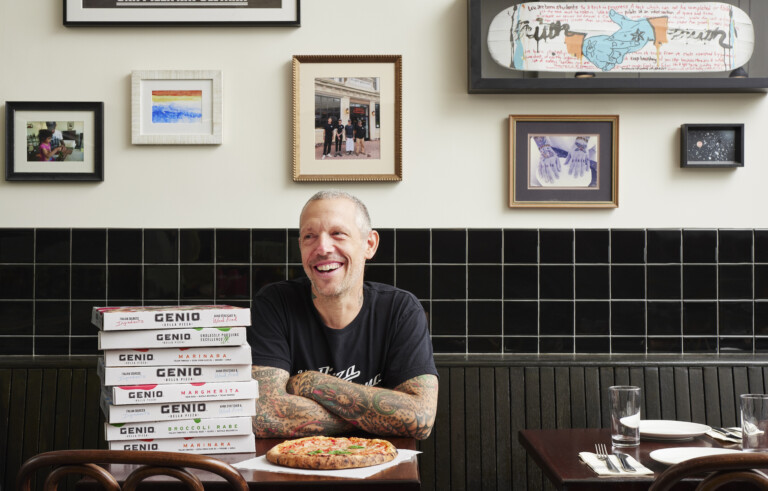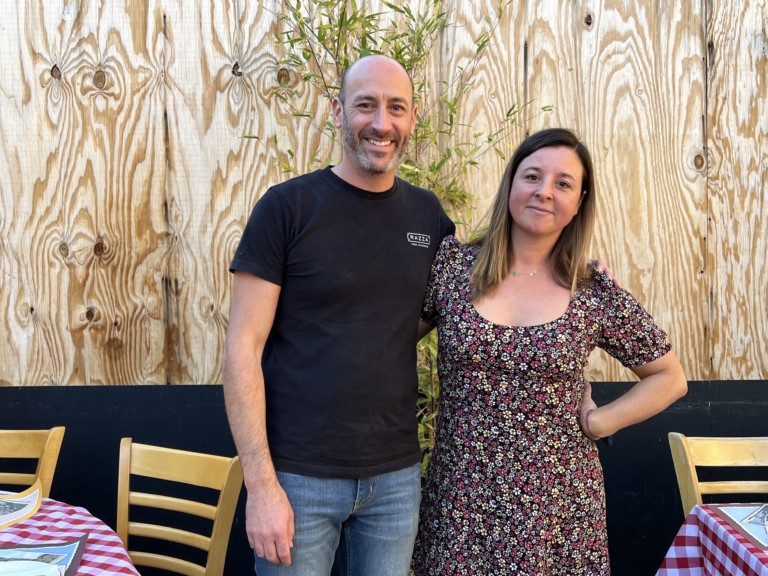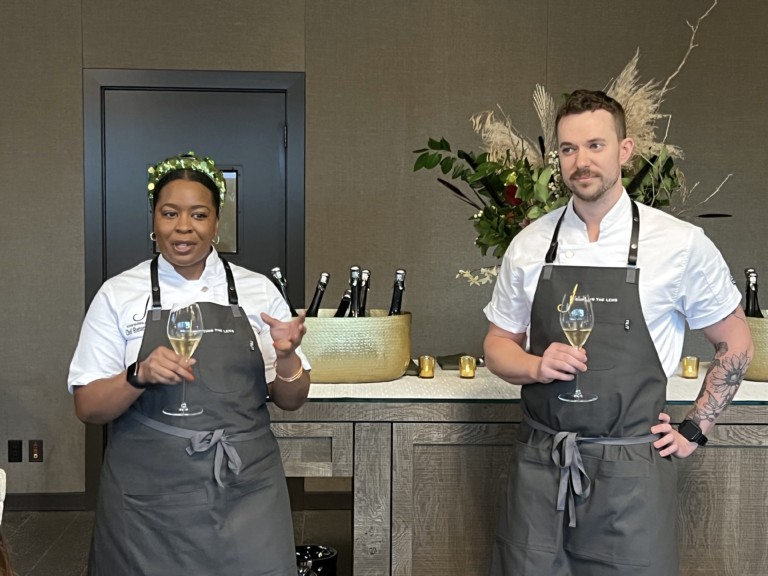INTERVIEW CONTINUED FROM PREVIOUS PAGE
What was the last dish that you created for SPQR, and what was your inspiration?
We actually put a dish on the menu last night. We have a garden up in the Napa Valley that is one acre or so. We’re able to grow a lot of our own vegetables. When you talk about things like evolution, originally I came up here to be closer to product, and eventually I realized I didn’t want to go and troll in the farmers markets for products I needed every week. It was too inconsistent, too unreliable, and it puts you into competition with every other chef who’s trying to do exactly the same thing. At some point, I realized I have to have better sources. So we sort of figured out to access space that was mostly our own. Up there right now we have – because we’re sort of between seasons – a lot of ground cover crops. One of those cover crops is fava, so we have all these fava shoots coming up because it’s been a little bit warm recently. I have all these plants that are six inches off the ground. I can go up and snip all the bright, green, vibrant, beautiful, young, tender fava leaves, and bring them back. We get really wonderful eggs from chickens that we have up there. We did a soft-cooked egg with this fava leaf salad and took some anchovies and dredged them in buttermilk and semolina flour and fried them, did some frico, crispy Parmesan, and then made an anchovy vinaigrette to go with it. It’s kind of a play on Caesar salad. The fava leaves just have this incredible velvety soft texture, and when they’re tender like that, they’re really sweet, and it’s kind of amazing. We put that on the menu last night, and that’s something I’m excited about, even for tonight’s service. I just think it’s fun, and that’s the whole thing. When you have that connection to your ingredient, how Italian is that dish? I have no idea. Caesar salad is not really an Italian concept. It’s an American concept.
Right. So, again, people will walk in here and see fava leaf “Caesar salad” and equate it as Italian food, but if I put that on the menu in Italy and told them that was Italian food, they’d be like, it wouldn’t register. That’s the possibility for innovation and redefining what something is outside of its own particular context. You’re giving somebody a framework that you’re working in. You’re taking a lot of liberties. My #1 pre-requisite for food is that if it doesn’t taste good, I don’t want to make it. Period. So we’re always asking ourselves, “Is this idea sound from a flavor perspective?” Flavor’s one of those things. Without it, there’s no point in eating.
I know you cook seasonally, but do you have such a thing as a top selling dish?
I think most chefs, especially as you’re in your earlier years, want to defy any dish that would be seen as a signature, or something you can’t take off your menu, but there are definitely things here. We do a smoked pasta, where we smoke the flour and make a pasta with that. And we glaze it in sea urchin and top it with a soft quail egg and some bacon and some black pepper, and again, it’s kind of a play on Carbonara, but nowhere on my menu does it say Carbonara. It’s just something that is. The quail egg on top is sort of evocative of Carbonara, but there’s no egg yolk in it. It’s the sea urchin that binds the pasta and creates what feels like a Carbonara type sauce. People love it. I love sea urchin and love being on the West Coast, close to that ingredient, where there’s a lot of it. Even in New York, it was coming from Maine, so still farther away than it is for me here, to get the ingredients. That dish stays on the menu most of the year. People absolutely love it. That’s something that defines that riff on Italian cooking, with an innovative sensibility and sort of a regional focus.
If I cooked in Utah or Seattle or New York or Charleston, South Carolina, my food would change, because my ingredients would change. I’m a chef who’s always going to look for things that are close at hand. That dish is born out of being in this locale. That’s one of those things that sticks around here.
That’s interesting, the subtlety of whether you call it Carbonara or not. Do you feel like, if you did, it would invite more scrutiny?
Well, I think that’s an interesting concept. Does it invite more scrutiny, or does it invite comparison? It’s one of those things, where I don’t want somebody to come into this restaurant and sit down in front of that bowl of pasta and say, “Now, I’ve had Carbonara at these three places in Rome, and I’ve had it at this Italian restaurant that I like over here, and then I came here and they say Carbonara, but it didn’t feel like the Carbonara I know.” All of a sudden, this person is having this internal conversation in their head, comparing it to a million different things, and they’re thinking about anything except being in that moment in time. They’re thinking about anything but that plate of food in front of them, the person they’re dining with, the wine they’re drinking. You have erased the entire joy of their dining experience, as far as I’m concerned, by sticking a word on a menu and trying to force something to be a connotation on a dish. Whereas I can just make something, give it to you, and someone will go, “This kind of feels like Carbonara.” “Okay,” and you just walk away. But for them it was evocative of it. And that’s why they pulled that in, and they felt good about it. Like I said, I know the food is delicious. I know that dish is delicious. I don’t need to tell them that. And I also don’t need to tell them that the conception of that dish for me was never based on Carbonara. I didn’t think about Carbonara and then make that dish. I made that dish and then thought, “It’s kind of like Carbonara.” It’s sort of that chicken and the egg thing.
For instance, that fava leaf “Caesar” says fava leaf quote-unquote Caesar on the menu. I didn’t go and look up what the definition of a Caesar was before I made that salad. I just thought, “This seems roughly evocative of it. Let me put that on there.” I’d be curious because I’ll have that discussion with myself over the next week or so, as it sits on the menu, whether or not “Caesar” needs to be there, whether or not I should get rid of it.
They’ve actually revived the place where the Caesar salad was created, Hotel Caesar’s in Tijuana.
Yeah? See. Because that is not purely an Italian concept, the way Carbonara is, is why I feel more comfortable saying “Caesar,” because it’s kind of a joke. It’s one of those things, I’m having a laugh at making that at all, because it’s one of those things that is ubiquitous. Every in-room dining menu in every hotel across the world seems to have a Caesar salad on it, and I don’t know why, if it’s trying to cater to some mass American palate that everybody thinks they’re satisfying, but to me, it’s kind of a joke to me. A high-minded, wanting to explore all these directions kind of chef, to put Caesar salad on the menu. It’s the same if you watch chefs who do things that are very tongue in cheek. So it’s sort of a tongue in cheek idea to put that on the menu. Ultimately, I always remind myself that I’m in the business of creating experiences for people and trying to bring joy into people’s lives through cooking. I try never to take myself too seriously, or to be too dogmatic about anything, to take risks and take chances and try new things, and you have a little fun with it, and you try to inspire the people that work around you, and the people that partake in what you’re doing. And creating memorable experiences for people. Because that’s really what life is about. There’s that balance. You can’t just be serious. I’m a very serious, very focused, very driven chef. At the same time, you have to be able to step back from your work and see a bigger picture. That’s something that I try to do on a regular basis. It also helps you refocus your energy. You have to be very customer focused. This is the hospitality business. I always tell people, it’s funny, because you get these young chefs coming to cook, and they realize they’re never going to be home on the holidays, and that they’re going to work nights and weekends. It’s sort of interesting to me that people don’t necessarily come into the business realizing 100% that’s what it is. I always tell them, “Whenever anybody else doesn’t work, that’s when you will work the hardest.” That’s the rest of your career, so you have to be able to find the joy in that and take that pride in delivering that hospitality, to excel in the long run.
Looking at your staff prepping for tonight’s service, what are some common threads, in terms of what it took for you to hire them in the first place?
I’ve always felt like I’ve been lucky, because for the most part they come to me. I’m sort of one of those people where people will come in and say, “Are you hiring?” You’re always hiring. You’re always looking for people that have passion and talent and desire. What you’re trying to do is take somebody’s innate desire for cooking and hospitality and service and harness that, and give them an opportunity to express that for themselves. I’m not trying to instill things in people that aren’t already there. I’m trying to find people that have those desires and have those passions and give them an opportunity to express it, in this format, as a team as a group. Instead of trying to use the hammer and bring everybody down, you’re trying to life everybody up. For me, you want to have people in the kitchen, you want people, when they make a mistake, they’re going to be harder on themselves than I’m going to be. I’m actually going to be the one that comes around the corner, “What did you do? Maybe we can do this with that instead?” Sometimes the happiest things, the innovations come through mistakes, to be honest. Sometimes something happens that you didn’t necessarily intend to happen, and that becomes the new idea. You always have to walk into it with an open mind and be the chef that comes around the corner, walks into something that didn’t quite turn out right, and sort of ask myself, “What are the possibilities?” It’s funny. Somebody told me, I’m one of five kids, I’m the middle child, and I don’t know that I got the most attention – let’s say – as a kid, which I relished at the time, because I could do whatever I wanted. Somebody said to me, “You don’t come from abundance.” I don’t come from a rich background. I don’t come from a background where I had everything that I wanted. I always find that in life, I tend to look at things and say, “This is what I have? What are the possibilities?” I sort of approach everything like that. Like I said, I walk into our garden, look at what’s there and say, “What’s here? What are the possibilities? What can I do with this?” And then sort of go from there. For me, that’s a good way to look at the world.
Has Emeril ever eaten at SPQR?
No. Every once in awhile, I’ll bump into him or hear about him. There are times through my career where he’s been supportive. There was another chef I worked for in New York, Rick Moonen, and I’ll actually be going to Las Vegas where he has a restaurant, in about a month, to cook a dinner there with him. Which is kind of an amazing thing. I’m going to cook at the James Beard House at the end of February, and they called to tell us the dinner was sold out, which I thought was pretty amazing. It’s always, “Wow, that many people want to eat your food? Great!” The last time I cooked at the James Beard House was 10 years ago with Rick. This is sort of exciting to see things come full circle and to watch your career grows.
Mentorship is a really important concept in this business. Without all the different people that have taken me into their kitchens, mentored me, given me that sense of enthusiasm. Without all those people that said, “Hey, you’re pretty good at this, maybe you should do this for a living,” maybe I never would have done it. That level of mentorship and encouragement is something that’s very important. I try and provide that to the people that work for me and let them follow their passions.









Leave a Comment